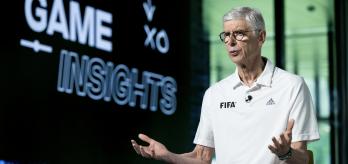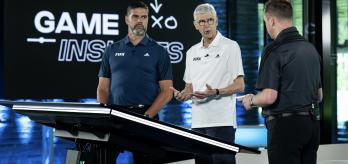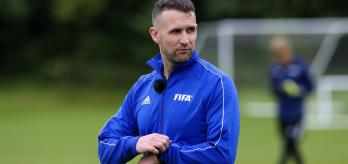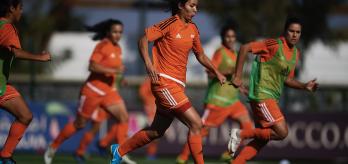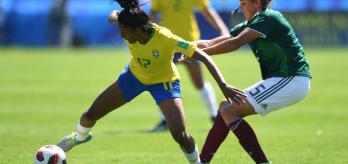In this three-part video for our Game Insights series, FIFA Group Leader Football Performance Analysis and Insights Chris Loxton is joined by world-cup-winning former US women's national team captain April Heinrichs and FIFA Senior Football & Goalkeeping Expert Pascal Zuberbühler to run the rule over the Canadians' unusual defensive tactics and find out how their iron will to win helped carry them to Olympic gold. In the final part of the programme, we speak directly to Canada Head Coach Bev Priestman to get the inside track on the secrets of her team's success.
Part 1: CANADA'S PRESS – A PLATFORM FOR OLYMPIC SUCCESS
03:13
Forcing the opposition inside
Canada played with world-record goal-scorer Christine Sinclair up front, and they knew they were very strong in central areas. With this in mind, they designed their press to force the opposition into the middle of the pitch. In this clip, taken from their match against Japan, we see Canada playing a very high line, with the midfield and strikers pressing the Japanese hard and eventually forcing the goalkeeper to give the ball away.
06:28
Pressing as a team
"If you are in this system, and everybody is playing it, from the goalkeeper to the strikers, then you can go [into] a proper press, and they demonstrated this in this tournament." (PZ)
06:40
Controlled aggression from the wing-backs
Canada pressed aggressively, but they also showed great defensive awareness. In this example, Allysha Chapman starts to press, then realises there is a Japanese player making a run in behind her and decides to drop back to provide cover. This shows she is reading the game effectively, but is also confident that the defenders behind her are able to deal with any threat from the opposition.
07:12
Canada keep their shape
Canada's match against Chile provided another outstanding example of just how well-drilled the Canadian side was. Here we see that Canada are again in a compact shape with a high defensive line. They press the Chileans to stop them getting the ball wide, in a move taken straight from the training ground. Chile manage to retain possession for a while, but Canada eventually squeeze the life out of the attack.
08:44
"Canada know they are going to win the ball in the midfield most times. Teams are going to get behind them occasionally, but they are going to win it centrally in this formation." (AH)
Part 2: COLLECTIVE WILL AND TEAM COMMITMENT
00:22
Will to win
The Canadians have always had a reputation for steely determination and athleticism, but this was the first time they returned from a major tournament with top honours. Against Brazil, Vanessa Gilles reflected their never-say-die attitude by making this lung-busting run and perfectly-timed tackle. The goalkeeper also shows impressive game intelligence; she reads the situation and decides to stay in the penalty area, because she realises Canada have a 2v1 situation in defence.
01:52 and 03:10
They shall not pass!
Here we see four separate examples of Canada's sheer determination to win the gold medal, all taken from the final against Sweden. In all four clips, the Canadian players initially lose out, but refuse to give up. Jessie Fleming's block in the final clip arguably typifies their attitude best of all. Fleming does everything a specialist defender would do 1v1, and when that fails, somehow gets her head in the way of the Swedish cross.
02:46
Mutual trust
"In the attack, and the way they attacked in this tournament, and the way that they defended, I think Bev [Priestman] demonstrated incredible confidence in her players. The players demonstrated clarity in their roles, and they flat-out performed when they needed to." (AH)
04:14
Sticking to the plan
Bev Priestman didn't change systems or make substitutions for the sake of it; any changes she made directly affected the game. The Canadians had faith in their gameplan and stuck to it. They absolutely determined to win the tournament, and no one was going to stop them.
05:05
Canada in possession: pass and move
To win football matches, you have to do more than defend stoutly, and Canada were highly effective in possession. This possession phase involves no fewer than nine players, and is built on the simple principle of pass-and-move. This style is key to Canada's football identity, and shows the level of trust the team-mates have in each other.
05:45
Patient build-up and clever movement
In this clip from the final, we see the wing-back is initially the furthest player forward, and the centre forward has actually checked her run, which stops Sweden's defence from pushing up. The Canadians then cycle the ball while the centre-forward tries to run in behind the Swedish defence. Eventually she receives the ball out wide, and Sweden have to block her pull-back to prevent a near-certain goal.
07:41
Canada's penalty: an example of team spirit?
This footage was recorded just after Canada had won a penalty through Sinclair. She initially picks up the ball to take the spot kick herself, but then hands it to a team-mate 15 years her junior, in the shape of Jessie Fleming. The change of penalty-taker might have been a tactical ruse, but it could also be seen as a selfless act in the best interests of the team. and another example of Canada's indomitable team spirit.
Part 3: BEV PRIESTMAN ON OLYMPIC TACTICS AND TEAM SPIRIT
00:30
What was your take on the tournament? Were there any key moments that stood out for you?
"Looking back, they weren't actually our best performances – I thought we had some better performances prior to the tournament. But it was a collective goal, and the group stuck to that goal. For me, probably, the turning point of the tournament was Brazil – that game went to penalty kicks. It wasn't a great game, but I think at that point, as a coach, I knew we could go all the way. It was a real moment where the group came together, and from that point onwards I knew we could go all the way, because the group showed an amazing amount of character and commitment to the greater goal. That was key for me. And then [there was] the first time this team beat the US, with that Canadian-US rivalry, the first time [Canada] beat them in 20 years. That changed the colour of the medal match. That was our goal. We achieved that, and we did it against the number 1 [side] in the world. That was massive for the group, and I think it took a lot out of them. We had to consider that going into the final against Sweden. You look at Christine Sinclair's face, and [you realise] she's been trying to do that her whole career, and you know as a coach how much that took out of them, emotionally, physically [and] mentally, to get that result. That took us on, and it was only ever going to be gold in that final."
02:00
We were fortunate to be in the stands watching that game. One of the elements we noticed was just the collectiveness of the team. Everybody was prepared to put their body on the line for each other, and there was obviously massive trust between you and the players that they would deliver the gameplan you had put in place.
"When I took over, I probably didn't realise it, but the trajectory of the group against Tier 1 teams wasn't great; I think it was eight or nine losses or draws, conceding a lot goals. And when I came in, with nine months to go to an Olympic Games, I knew I had to very quicky get a belief, get a shared vision, and stop conceding goals, because it's not been a Canadian trait. We've always been very good defensively. So I put a lot of work into, not just the tactics, but more the mindset and behaviours that sit within defending and attacking. We went after three behaviours in possession and three behaviours out of possession. It didn't matter what shape, what tactics, or what the opposition did – every individual was accountable [for] that behaviour. We celebrated that, game after game, and if you add that up over a period of time, it comes to fruition. Which it did, luckily for us, in that Olympic Games."
03:18
We don't see teams forcing the opposition to play centrally very often, but with that diamond midfield you had, it worked so well for you. Can you give us a little bit of insight into why you thought that would work going into the tournament, and how you implemented that?
"If you are taking over with nine months to go, you've got to look at the players in front of you. We've got wide forwards with a lot of pace, and then you've got Christine Sinclair's quality. And there was no way I was going to ask Christine Sinclair to go and press the centre-backs, because I know that when she has the ball, we need her quality. So it was really designed around the strength of the team and getting the best out of the best players. That's what we look to achieve."
04:21
First of all, well done on a great tournament. It was impressive to see how your team performed physically as well, how high the defensive line was, how compact you were, and the press. You can only press the way you did if you are very fit. But Stephanie Labbé was perhaps the key player in your team and in the tournament. She was brave and she was full of confidence. She helped you win two penalty shootouts. What was your view of her performance, and how important was she for you?
05:20
"She was incredible. It was probably the performance of her career, and she's now retired, and she's gone out on top. What people don't know is that right up until that opening game against Japan, it wasn't clear who the number 1 goalkeeper was. And so someone of Steph's calibre had to fight for nine months to get that spot. And I think when you do that, and there is that level of uncomfortable, you find new levels of performance. She was incredible. We couldn't have got gold without her. Her confidence went through the group: she saves a penalty, she makes big saves, and I think straight away, if you're a player in the team, it really drives that level of confidence to know you've got someone who's not only going to keep the ball out of the net, but with the ball, she just brings so much to the group. And I think it gives confidence to a backline when you have a goalkeeper who can play with her feet so well."
06:17
Who made the final decision on the number 1 spot? Of course, you are the boss, but who made the decision? You? Or your goalkeeping coach? Or was it your full staff?
"The full staff and the goalkeeping coach had a big say in it, but ultimately the buck stops with me with the final decision. But I would say it was a collective decision and we all agreed. I think we'd done the due diligence up to that point to give Steph and Kailen Sheridan enough time to assess them. The buck stops with me, but I'm very inclusive and collaborative with the staff; everyone's view is welcomed."
07:08
We are around 12 months from the Women's World Cup in Australia and New Zealand next year. What are your expectations of that tournament?
"I think our expectations are that we [should] do as well in World Cups as we do in the Olympic Games. This team never really conquered the World Cup, but we've always done well at the Olympic Games. And I think we're approaching the World Cup differently because it's a totally different tournament – twice as long, longer between games, [different] level of opposition – you can go from playing the number 1 in the world to number 30 in the world in the next game. So we've put together a strategy that's specific to the World Cup. We will be aiming to be on the podium of that World Cup, for sure."











